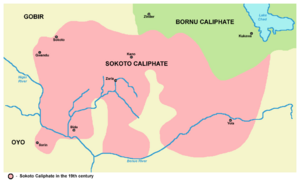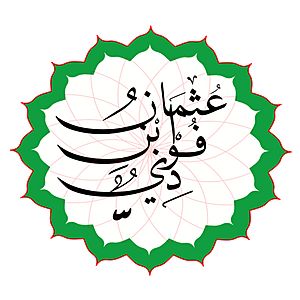Usman dan Fodio facts for kids
Quick facts for kids Uthman ɗan Fodioعثمان بن فوديُ |
|
|---|---|
| Amir al-Mu'minin Imama Shaykh |
|
| 1st Caliph of the Sokoto Caliphate | |
| Reign | 1803–1817 |
| Coronation | Gudu, June 1803 |
| Predecessor | Position established |
| Successor | Muhammad Bello |
| Born | 15 December 1754 Gobir |
| Died | 20 April 1817 (aged 62) Sokoto |
| Burial | Hubare, Sokoto. |
| Wives |
|
| Issue | 23 children, including: Muhammad Bello Nana Asmau Abu Bakr Atiku |
| Dynasty | Sokoto Caliphate |
| Father | Mallam Muhammadu Fodio |
| Mother | Hauwa bnt Muhammad |
| Religion | Islam |
| Denomination | Sunni |
Usman Ɗan Fodio (born December 15, 1754 – died April 20, 1817) was a Fulani scholar, religious teacher, and leader. He started a big change and founded the Sokoto Caliphate, ruling as its first leader, called a caliph.
Usman was born in Gobir and came from a Fulani family. He became very knowledgeable in Islamic studies. Soon, he began teaching Sunni Islam across parts of modern Nigeria and Cameroon. He wrote many books about religion, government, and society. He believed that some African Muslim leaders were greedy and not following Islamic laws.
Usman started an Islamic movement that spread from Gobir across West Africa. In 1803, he founded the Sokoto Caliphate. His followers chose him as their leader, calling him the Commander of the Faithful. Usman declared a holy war (jihad) against the Hausa Kings and defeated them. Under his leadership, the caliphate grew to include parts of Burkina Faso, Cameroon, Southern Niger, and most of Northern Nigeria.
Usman did not like the fancy parts of being a ruler. He soon gave the actual leadership of the Sokoto state to his son, Muhammed Bello. Usman encouraged everyone, including women, to learn and read. Several of his daughters became scholars and writers. His teachings are still important today in Nigeria, where he is often called Shehu. Some people believe he was a mujaddid, a special reformer sent by God to renew Islam.
Usman ɗan Fodio's movement was a major part of the Fula jihads in the 17th, 18th, and 19th centuries. These movements led to the creation of other Islamic states in West Africa. Usman inspired later leaders like Seku Amadu and Omar Saidou Tall.
Contents
Early life and teachings
Usman was born in December 1754. His family was Fulani and well-known in Hausaland. His father, Muhammad Fodio, was an Islamic scholar. Usman's mother, Hauwa, is believed to be a direct descendant of the Islamic prophet Muhammad. When Usman was young, his family moved to Degel, where he studied the Quran.
At age 20, Usman opened his own school in Degel. He taught people to follow Islam more strictly. He became very skilled in Islamic science, philosophy, and theology. His teacher, Jibril ibn Umar, was a strong supporter of jihad. From 1774, Usman traveled and preached for many years in Gobir, Kebbi, and Zamfara. Among his students were his younger brother Abdullah and the Hausa King Yunfa.
Usman wrote against the Hausa rulers. He said they were unfair, greedy, and did not follow Islamic law (Sharia). He also disliked the mixing of men and women, pagan customs, and certain traditions at weddings. In 1789, a vision made him believe he could perform miracles. He also started teaching his own special prayers, which are still used today. Later, he had visions of Abdul Qadir Gilani, a famous Islamic figure. Usman became the head of his Qadiriyya brotherhood, working to make Islamic practices purer.
He wrote many books in Arabic and the Fula language. These books talked about the role of scholars in teaching history and the idea of a "renewer" of Islam. Usman left the royal court and created a religious community in his hometown of Degel. He hoped this community would be a perfect example of an Islamic town. He lived there for 20 years, writing, teaching, and preaching.
The Sokoto Caliphate
How it started
In the late 1700s, Usman's fame grew. He spoke about justice and fairness, attracting many people who felt left out by Hausa society. Farmers, slaves, and preachers supported him. Fulani herders and their religious leaders also joined him. Many of Usman's followers later held important positions in the new state. His movement brought many different groups of people together under one religious and political goal.
Around 1797, King Nafata of Gobir made rules against Islamic teachers. He banned them from preaching and ordered new Muslims to return to their old religions. Usman strongly disagreed with this. He wrote that if a king is not a true Muslim, his land is not a Muslim land, and people should leave it.
In 1802, Nafata's successor, Yunfa, who was once Usman's student, turned against him. Yunfa tried to kill Usman and took away Degel's independence. Yunfa warned other Hausa leaders that Usman could start a widespread jihad. In February 1804, Usman and his followers moved to Gudu. There, they asked for help from local Fulani nomads. Usman's followers named him the Commander of the Believers and their leader. In the same year, Usman began the jihad and founded the Sokoto Caliphate.
By this time, Usman had many followers among the Fulani, Hausa farmers, and Toureg nomads. This made him a strong political and religious leader. He had the power to declare jihad, raise an army, and lead it. There were many uprisings in Hausaland. The leaders of these uprisings were mostly Fulani, and they had strong support from Hausa farmers. These farmers felt that their rulers were taxing them too much and treating them unfairly.
Spreading Islam
After Usman declared jihad, he gathered an army to attack Yunfa's forces. Yunfa's army defeated Usman's forces in one battle, killing about 2,000 soldiers. However, Usman quickly recovered. The next year, he captured Kebbi and Gwandu. News of the jihad spread along trade routes and rivers. The call for jihad reached other Hausa states like Kano, Daura, Katsina, and Zaria. It also reached places like Borno, Gombe, Adamawa, and Nupe.
By 1808, Usman had defeated the rulers of Gobir, Kano, Katsina, and other Hausa Kingdoms. After only a few years of fighting, Usman was in charge of the Hausa states and the Fulani Empire. The Sokoto Caliphate became the largest state south of the Sahara Desert. In 1812, the caliphate's government was reorganized. Usman's son Muhammed Bello and his brother Abdullahi dan Fodio took over leading the jihad and managing the western and eastern parts of the state. Around this time, Usman went back to teaching and writing about Islam. He also worked to create a good government based on Islamic law.
The Sokoto Caliphate was an Islamic state that also kept some Hausa traditions. Muhammed Bello brought in Islamic ways of governing. Muslim judges, market inspectors, and prayer leaders were appointed. An Islamic tax system was set up. Mosques and religious schools were built to teach people about Islam. The state supported many religious scholars. Sufism, a mystical branch of Islam, became very popular. Arabic, Hausa, and Fulfulde languages saw a rise in poetry, and Islam was taught in Hausa and Fulfulde.
Death and legacy
In 1815, Usman moved to Sokoto, where his son Bello built him a house. Usman died in Sokoto on April 20, 1817, at the age of 62. After his death, his son Muhammed Bello became the second caliph of the Sokoto Caliphate. Usman's brother Abdullahi was made the Emir of Gwandu. He was put in charge of the western parts of the caliphate.
This meant that all Hausa states, parts of Nupe, and Fulani areas in Bauchi and Adamawa were ruled by one system. By 1830, the jihad had spread across most of what is now northern Nigeria and northern Cameroon. From Usman ɗan Fodio's time until the British took over in the early 1900s, there were 12 caliphs.
Usman is seen as a very important leader in Africa. Muslims consider him a Mujaddid, meaning a renewer of the faith. Many Fulani people were unhappy that the Hausa rulers were mixing Islam with older local religions. Usman created a state based on a stricter interpretation of Islam. He wrote that rulers who practice non-Islamic rituals are not true believers, even if they say they are Muslim.
David Westerlund wrote that Usman's jihad created a state where different areas had a lot of freedom. However, they all recognized the spiritual authority of the caliph of Sokoto. Usman wrote about what he saw as problems with African rulers who were not fully Muslim. He accused them of corruption and ignoring the rights of ordinary people. He also criticized heavy taxes and unfair laws that hurt business and trade. Usman believed in a state that followed the Quran, the Sunnah, and the agreement of scholars, without a written constitution.
Family
Usman ɗan Fodio was described as tall and thin, looking much like his mother, Sayda Hauwa. His brother Abdullahi dan Fodio was also tall.
Waziri Gidado ɗan Laima, a scholar, listed ɗan Fodio's wives:
- His first cousin Maymuna, with whom he had 11 children. These included Aliyu and the twins Hasan and Nana Asmaʼu. Maymuna died after her youngest children were born.
- Aisha ɗan Muhammad Sa'd, also known as "Gaabdo" (Joy) or "Iyya Garka" (Lady of the House). She was known for her Islamic knowledge and was the main mother figure of the family. She lived many decades longer than her husband. She was the mother of Muhammad Sa'd, among others.
Writings
Usman ɗan Fodio wrote hundreds of books on Islamic topics. These included books about beliefs, law, and poetry. Most of his writings were in Arabic. He also wrote about 480 poems in Arabic, Fulfulde, and Hausa.
See also
 In Spanish: Usman dan Fodio para niños
In Spanish: Usman dan Fodio para niños
- Fulani Empire
- Hausa Kingdoms
- History of Nigeria
- Legends of Africa
- Makera Assada
- Muhammad al-Maghili
- Muhammed Bello
- Nana Asmaʼu
- Sokoto
- Usmanu Danfodiyo University
 | Percy Lavon Julian |
 | Katherine Johnson |
 | George Washington Carver |
 | Annie Easley |



